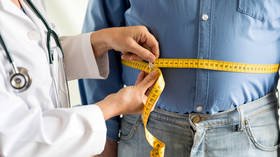Obesity is a killer and Covid is brutal to fat people, so why are we doing nothing to tackle this ticking time bomb?

A huge 42% of Americans are obese and that figure’s likely ballooned during lockdown. Yet medical chiefs are silent about this, our media laud the morbidly overweight, and you can get free donuts with your vaccines. Why?
The CEO of salad chain Sweetgreen was recently chastised by leftist journalists for a LinkedIn post suggesting that obesity has been a significant factor contributing to poor health in the context of Covid morbidity and mortality. Vice magazine took similar umbrage when the CEO of Whole Foods expressed the same kind of sentiment last year, one he's offered for a decade. Vice's criticism of the self-serving solution offered by these businessmen – government taxation of high-calorie foods that would, one might suppose, shift consumer dollars to expensive salads and groceries – may be appropriate, but even the online mag admitted Jonathan Neman of Sweetgreen was “on to something” with his identification of obesity as a contributing factor to poor health, especially in the midst of a global viral pandemic.
Commenters called his comments “disgusting” and “fat-phobic,” and Neman was eventually forced to apologize, but the evidence is overwhelming that obesity is associated, more than any other factor besides age, with poor outcomes in Covid-19 patients. Data from around the world has demonstrated and quantified that truth since the first half of 2020, relatively early in the pandemic. Medical leaders in positions of authority and influence, most significantly Anthony Fauci, publicly recognized this fact as soon as it became clear, which leads to an important question.
Why have those same medical leaders said virtually nothing about obesity in the last 18 months?
Prior to the pandemic, Jerome Adams, former surgeon general of the United States under Donald Trump, addressedAmerica's obesity problem. In the age of Covid, however, he chatters about masks almost exclusively. In fact, a search of his Twitter account, which Dr. Adams uses regularly, fails to find a single tweet about obesity in any context of Covid.
Also on rt.com As a doctor, here’s my message to anyone who thinks it’s OK to deny medical treatment to those unvaccinated against CovidDr. Fauci is a media fixture these days, lecturing the public about everything from masks and lockdowns to social distancing and vaccine boosters. Early this year, Forbes declared that America's obesity crisis needs its own “Dr. Fauci” to help fight it; one must wonder why the actual Dr. Fauci isn't doing so.
The Biden administration was encouraged from its inception to address obesity as a critical tool in its battle against Covid-19, yet nobody in the White House, despite almost-nonstop communication about coronavirus, will discuss the topic. The Centers for Disease Control and Prevention has a web page about obesity's relationship with Covid, but it provides little information, and its guidance is sparse; a Google search of ‘CDC Covid obesity’ turns up sparingly little (in fact, the second piece of news is the Sweetgreen apology mentioned above).
This failure to address a major preventable factor in Covid mortality is a failure of public health policy and its leaders, and it's a failure that has cost lives.
At the beginning of Covid's spread, the obesity rate in the United States stood at 42.4%, up from 30.5% just twenty years ago. If the overweight category is included too, the number jumps to a shocking 73.6% of the US population. Just this August, JAMA reported that obesity in American children ages 5 to 11 had increased during the pandemic from 36.2% to 45.7%; disturbingly, data was only gathered through January 2021, so the number may be even higher now. When viewed in the light of obesity's proven association with Covid, the consequences of these figures become dire indeed.
From a physiological standpoint, it makes sense that the overweight and obese struggle with Covid and the havoc it wreaks on the lungs. Obesity impairs normal respiratory mechanics and is an underlying cause of serious chronic disease, including type 2 diabetes, hypertension, and cardiovascular disease – all of which also correlate with poor outcomes in coronavirus patients.
The benefits of using the immediacy of the Covid pandemic to address America's obesity problem are clear, but ironically, it almost seems that authority figures, public policies, and social phenomena have actively opposed efforts to stay physically fit.
A policeman chases a runner jogging on an empty beach without a mask.
A New Jersey gym is harassed by the state.
Also on rt.com Corporate America would never allow a ‘healthy food mandate’ like they have ‘mask mandates’ – junk food is far too profitableKrispy Kreme offers free donuts by the dozen to healthcare providers. (When I stopped by last year, dubious, I was told I could have up to five dozen donuts free. I did not take home five dozen donuts.)
Citizens by the millions have been obligated by their governments to stay home, watching streaming services or playing video games, ordering processed, calorie-dense delivery junk food. Months upon months of behavioral habits won't disappear soon or without effort; the obesity rates keep rising.
The irony would be almost comical, were the consequences to health and life not so dire.
Meanwhile, a movement to shame and shout down any public voice who expresses the same sentiment as the CEOs of Sweetgreen or Whole Foods continues apace. Sports Illustrated, a magazine nominally dedicated to athletic excellence, now includes in its Swimsuit Edition – once strictly a showcase for women who represented the pinnacle of slim, supermodel physique as society's aesthetic ideal – the unapologetically morbidly obese. When celebrities like Rebel Wilson and Adele lose weight, they're as likely to be met with criticism as praise for changing their habits for the healthier. Meanwhile, severely obese women are given laudatory cover articles in major magazines. In the best of times, this trend is worrying, but to let it continue unchecked during this public health crisis is inexcusable.
One can only speculate why the supposed generals in the war against the coronavirus will barely mention the deadly saboteur of obesity. Perhaps they fear the ire of ‘Health at Every Size’ proponents or the risk of offending a demographic that currently includes almost three-quarters of America. Maybe fomenting the public's anger at strangers unmasked in the local grocery store, rather than recommending the tough introspection and behavioral changes needed to combat excess weight, individual by individual, is a policy path too low-effort to pass up. Whatever the reason, it's apparent we must ourselves resolve to tackle our collective weight problem.
This discussion isn't about aesthetics, nor is it a commentary on any one person's intrinsic value as a human. One's body mass index isn't an immutable characteristic. Famously fit people get fat. Famously fat people get fit. Habits can change. Now, more than ever, is the time to exchange bad ones for good. Fortunately, the solutions are simple, although they aren't easy. If you need to shed excess pounds, here are a few places to begin.
Eat less. Ultimately, your weight is a function of calorie balance; expending more energy with activity than you input with food and drink is the mechanism of every diet that's ever existed. Do away with the specious canard that ‘eating healthy costs more’. Even ignoring that healthy food is affordable and cheap, it costs less to eat less, whatever form those calories take.
Also on rt.com Porn. Booze. Fags. Crap food. Domestic violence. Never mind the death rate, Covid-19 has brought out the worst in humanityDon't drink your calories. Call it pop, soda, fizzy drink, or your brand name of choice; soft drinks offer no nutritive value and tons of calories. Often, simply switching out sugary beverages for water will result in appreciable weight loss.
Be active. Crunches, push-ups, lunges, and air squats can all be done in a one-bedroom apartment, and more expensive options for space-saving home workouts, from videos to Peloton to Mirror, have never been more available. While cutting dietary calories is a more efficient way to lose weight for most people who need to, the benefits of regular exercise extend beyond the scale.
Bring the topic of weight up with your physician. Many doctors shy away from counseling about obesity, sensitive to the feelings of patients who, offended, might find another practice but leave a scathing online review behind. Allay that fear. A physician can't make anyone lose weight – that's up to the individual, ultimately – but he or she can be a valuable ally in the journey.
The failure of medical leadership to address obesity in the context of Covid-19 is perplexing and indefensible. It's left to us to do it ourselves; it was always our battle, anyway.
Encourage one another. Change how we eat and live. We can do it. We must. Let's begin today.
Think your friends would be interested? Share this story!
The statements, views and opinions expressed in this column are solely those of the author and do not necessarily represent those of RT.














